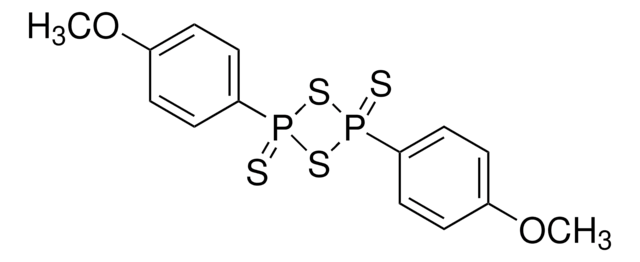634239
Chromium(III) oxide
nanopowder, <100 nm particle size (TEM), 98% trace metals basis
Synonym(s):
Chromia
Sign Into View Organizational & Contract Pricing
All Photos(3)
About This Item
Empirical Formula (Hill Notation):
Cr2O3
CAS Number:
Molecular Weight:
151.99
EC Number:
MDL number:
UNSPSC Code:
12352302
PubChem Substance ID:
NACRES:
NA.23
Recommended Products
Assay
98% trace metals basis
form
nanopowder
particle size
<100 nm (TEM)
SMILES string
O=[Cr]O[Cr]=O
InChI
1S/2Cr.3O
InChI key
QDOXWKRWXJOMAK-UHFFFAOYSA-N
Looking for similar products? Visit Product Comparison Guide
Application
Used in a solid-state reaction to form the new ternary oxide, CrVMoO7, can be used in selective oxidation.
Storage Class Code
11 - Combustible Solids
WGK
nwg
Flash Point(F)
Not applicable
Flash Point(C)
Not applicable
Personal Protective Equipment
dust mask type N95 (US), Eyeshields, Gloves
Certificates of Analysis (COA)
Search for Certificates of Analysis (COA) by entering the products Lot/Batch Number. Lot and Batch Numbers can be found on a product’s label following the words ‘Lot’ or ‘Batch’.
Already Own This Product?
Find documentation for the products that you have recently purchased in the Document Library.
Customers Also Viewed
In vitro macrophage response to nanometer-size chromium oxide particles
VanOs R, et al.
Journal of Biomedical Materials Research. Part B, Applied Biomaterials, 102(1), 149-159 (2014)
Viswanathan Swaminathan et al.
Journal of biomedical materials research. Part B, Applied biomaterials, 98(2), 369-378 (2011-06-08)
Hard coatings for articulating surfaces of total joint replacements may improve the overall wear resistance. However, any coating approach must take account of changes in corrosion behavior. This preliminary assessment analyzes the corrosion kinetics, impedance and mechanical-electrochemical stability of 100
Luiz C A Oliveira et al.
Journal of hazardous materials, 192(3), 1094-1099 (2011-07-15)
In this work, hydrogen peroxide decomposition and oxidation of organics in aqueous medium were studied in the presence of activated carbon prepared from wet blue leather waste. The wet blue leather waste, after controlled pyrolysis under CO(2) flow, was transformed
Jordi Cirera et al.
The Journal of chemical physics, 137(5), 054704-054704 (2012-08-17)
The effects of electronic polarization on the adsorption of water in the MIL-53(Cr) metal-organic framework are investigated using molecular dynamics simulations. For this purpose a fully polarizable force field for MIL-53(Cr) was developed which is compatible with the ab initio-based
Yuanmin Wang et al.
Langmuir : the ACS journal of surfaces and colloids, 29(3), 950-956 (2012-12-20)
We investigate the single-cell reduction of toxic Cr(VI) by the dissimilatory metal-reducing bacterium Shewanella oneidensis MR-1 (MR-1), an important bioremediation process, using Raman spectroscopy and scanning electron microscopy (SEM) combined with energy-dispersive X-ray spectroscopy (EDX). Our experiments indicate that the
Our team of scientists has experience in all areas of research including Life Science, Material Science, Chemical Synthesis, Chromatography, Analytical and many others.
Contact Technical Service











